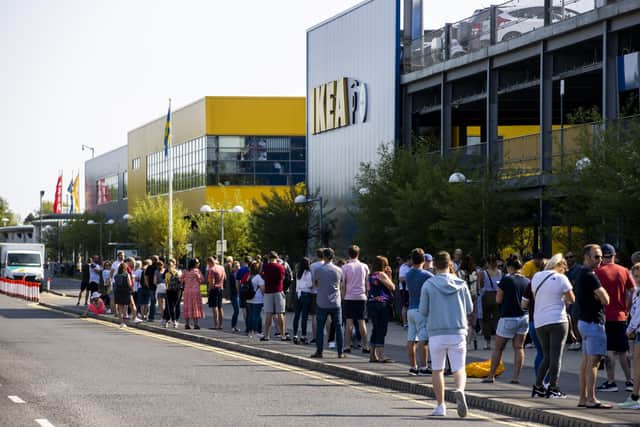Alex Kane: It’s a mistake to think we’ve won the war against coronavirus


When I had my original worries about CV-19 (in early January, while I was reading a piece about what was happening in Wuhan City) I was as much in the dark as everyone else. There were no certainties, but lots of speculation and scare stories. Yet it wasn’t long before the body-language and statements of politicians, scientists, virologists and other assorted experts around the world convinced me that I was right to be concerned. They looked and sounded very worried. Sometimes they even appeared to be downright terrified: like the line-up of white-coated experts you used to see in 1950s sci-fi films.
I’m old enough to have had these sorts of worries before. I remember the health and protection warnings about Aids (death toll estimates were enormous) on radio, television and in full-page newspaper adverts. I remember the ‘mad cow’ scares in the mid-1980s and mid-1990s. In 1996, scientists at Imperial College predicted that millions of people could develop a new variant of Creutzfeldt-Jakob disease (CJD) and estimated that upwards of 10 million could die: although by 1998 they had reduced the predicted death toll to 500,000. The actual figure was 17. Oddly enough, back then I had no real sense of fear. I was aware, yet not scared.
Advertisement
Hide AdAdvertisement
Hide AdBut this time it really did feel different, particularly when whole countries closed down their economies, went into lockdown and persuaded the vast majority of their citizens to remain at home for weeks on end. It was soon evident, though, that governments hadn’t actually war-gamed for this sort of scenario. War-gaming is a branch of government nowadays, with politicians, scientists, military, actuaries, economists, key suppliers et al, drawing up plans for a coherent response to a series of emergencies. Yet I’m not sure that keeping people indoors for long periods, while businesses remained shuttered, was actually thought through.


The other problem is that the whole crisis became politicised very quickly. Conspiracy theorists are having a field day. Donald Trump, having originally said the virus would never reach US shores, has changed tack and is now openly blaming China for causing the deaths of over 100,000 Americans. Scientists disagree with each other about causes and cures. Social media (which clearly loves a pandemic) is suddenly awash with ‘experts’ who couldn’t even have spelt coronavirus three months ago. Somehow the battle against the virus has also become a battle between left and right (although I’m pretty sure the virus itself doesn’t take sides).
At the start I was worried about the impact of an unknown, yet seeming deadly virus, on someone my age (I’ll be 65 in August). I was also worried about the impact it would have on my youngest child, who will be three in July. I remain worried. There was an argument in favour of lockdown but, as I say, it became clear within days that it hadn’t been thought through. It just looked like we had shut down the country and imposed restrictions on movement because nobody knew what else to do. And they still don’t.
Two months of unexpectedly good weather – along with the furlough schemes, mortgage holidays, loan structures etc – gave a false impression that all was well. We enjoyed the novelty and consoled ourselves that a vaccine would be discovered quickly and that life would return to normal fairly soon. That was before mental anguish for millions kicked in; followed by concerns about redundancy, the education of our children, the likelihood of a massive, lengthy recession and having to adjust to a new norm.
Advertisement
Hide AdAdvertisement
Hide AdWorse, Boris Johnson has sounded increasingly fatuous in his desperate attempt to look as if he is in control and pursuing a coherent strategy. But he has no better idea than the rest of us about what is likely to happen. He knows that he has lost the battle on lockdown. He knows, too, that the adjustments required for life post-lockdown will continue to place huge pressure on the economy. Yet not once has he managed to deliver the sort of ruthlessly honest analysis that is required at this moment: an analysis that must embrace brutal economic realities as well as the response required if there is a post-lockdown surge of CV-19.
All of which may explain why lockdown is collapsing – although imploding is probably a better term to use. Increasing numbers of people don’t actually give a damn about what he says. They don’t give a damn about timetables. They are no longer scared of this virus. They want out and they are going out. He is not going to stop them. Police fines won’t stop them. And when one business is given the green light to open others won’t wait: they’ll just follow along. Social distancing will disappear overnight. Let’s see how orderly a queue outside a shop will be when the colder, wetter, darker days of autumn roll along.
What happens then? Will there be another wave – this time involving far more people because there will be far more people out again? In the last few months we knew it hit old people particularly hard, but what about the millions more from younger age groups who will be out and exposed this time? What happens if there’s a surge, but no vaccine; or a surge which the NHS can’t cope with? So many questions and yet so little clear response from the government.
Back in early March Kerri (my partner) and I made decisions about how we would look after ourselves, the three children and our broader family. We listened to the advice from various sources and tailored it to our own circumstances. We will continue to do that. We will continue to act with caution. My worry is that we will be in a minority. I sense a gung-ho mentality, which has maybe something to do with the recent VE-Day celebrations. Worryingly, I also fear that too many people believe the war against CV-19 is over and that we have won.
It isn’t. We haven’t.
—— ——
A message from the Editor:
Advertisement
Hide AdAdvertisement
Hide AdThank you for reading this story on our website. While I have your attention, I also have an important request to make of you.
With the coronavirus lockdown having a major impact on many of our advertisers - and consequently the revenue we receive - we are more reliant than ever on you taking out a digital subscription.
Subscribe to newsletter.co.uk and enjoy unlimited access to the best Northern Ireland and UK news and information online and on our app. With a digital subscription, you can read more than 5 articles, see fewer ads, enjoy faster load times, and get access to exclusive newsletters and content. Visit https://www.newsletter.co.uk/subscriptions now to sign up.
Our journalism costs money and we rely on advertising, print and digital revenues to help to support them. By supporting us, we are able to support you in providing trusted, fact-checked content for this website.
Alistair Bushe
Editor